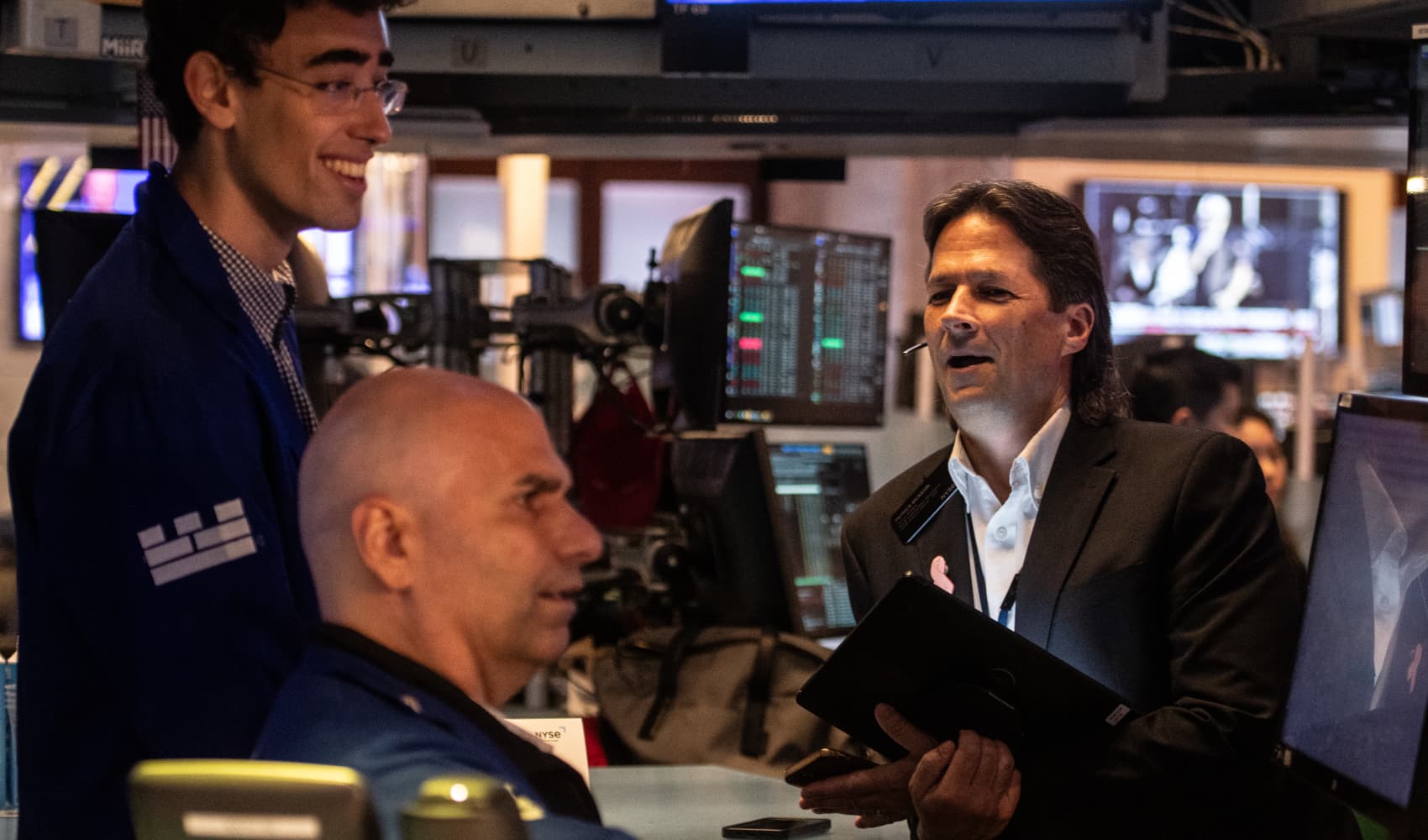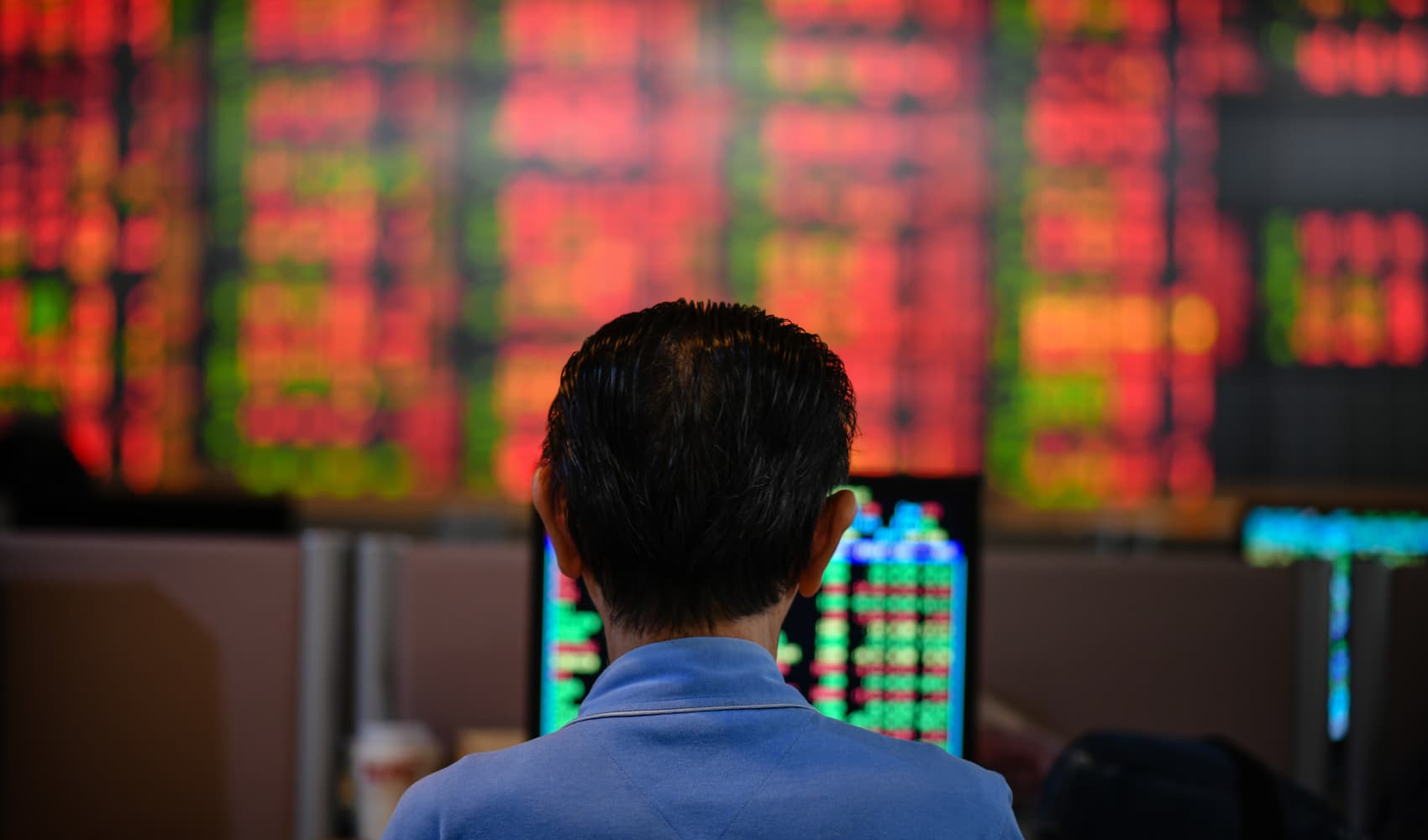
The Nasdaq Composite fell for a sixth straight session on Friday, notching its longest losing streak in more than a year. The downtrend comes as Nvidia dived, adding to recent market woes tied to geopolitical conflicts and sticky inflation.
The tech-heavy Nasdaq pulled back 2.05% to 15,282.01, while the broad S&P 500 slipped 0.88% to 4,967.23, below the 5,000 level. Both clinched their sixth straight negative days, streaks not seen for either since October 2022.
The Dow Jones Industrial Average rose 211.02 points, or 0.56%, to finish at 37,986.40. The 30-stock index was lifted by a rally of more than 6% in American Express following earnings{
American Express boosts Dow
Get top local stories in San Diego delivered to you every morning. Sign up for NBC San Diego's News Headlines newsletter.
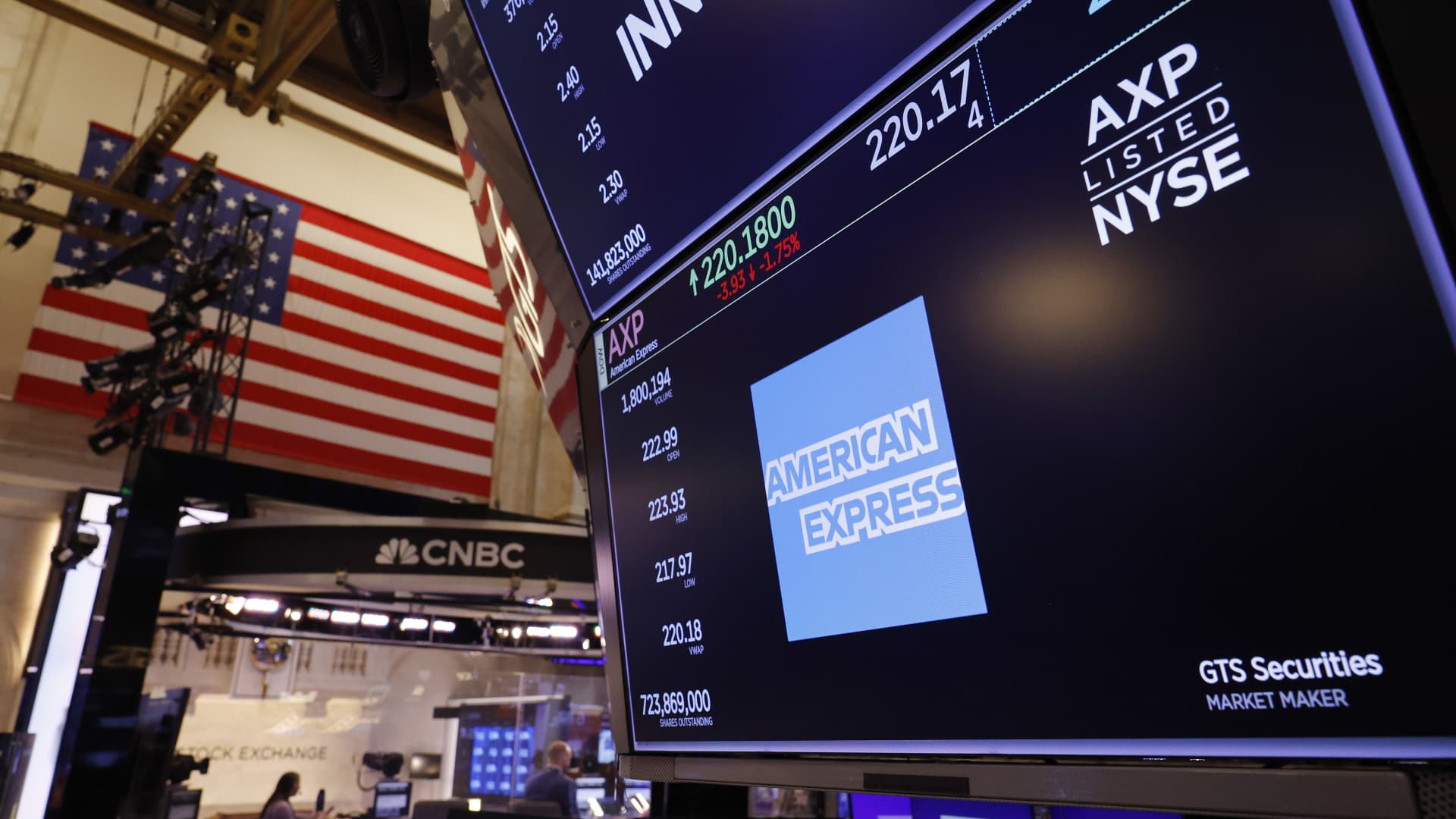
The Dow has once again outperformed on Friday, lifted by American Express' post-earnings rally.
The blue-chip average is the only of the three major indexes poised for gains in Friday's session. It has also seen the smallest loss on a weekly basis.
Money Report
American Express led the index higher on Friday, with shares jumping more than 4%. The financial company posted stronger-than-expected diluted earnings per share and reaffirmed full-year guidance.
UnitedHealth and Chevron were the next-biggest advancers on Friday, with each up more than 1.5%. About 2 out of every 3 of the 30 Dow members traded higher in the session.
— Alex Harring
Netflix retreated more than 9% even after quarterly earnings beat on the top and bottom lines. The streamer's subscribers jumped 16% from the previous year, but it said it would no longer report paid memberships starting in 2025.
Chip stocks were also under increasing pressure{
Super Micro Computer shares take a tumble on Friday
Super Micro Computer shares plunged more than 18% on Friday. The stock continued its sharp weekly decline after the server maker announced its third-quarter earnings date of April 30, but did not give preliminary results as it previously has.
Shares of Super Micro, which was added to the S&P 500 last month, are still up 165% for the year, despite dropping more than 25% this quarter as several AI plays have taken a tumble. The stock is on track to notch its steepest drop since Feb. 16, when it fell about 20%.
— Pia Singh
Super Micro ComputerWhile tech put downward pressure on the market, investor concerns over intensification of the Middle East conflict following Israel's limited strike on Iran appeared largely shaken off by Friday's open.
Oil prices briefly spiked more than 3%, but swung between more modest gains and losses in the hours since. Dow futures at one point fell more than 500 points overnight amid fears that the attack was enough to spark a broader war.
"There was a relief sigh" as investors realized Israel's response was "muted" and designed to minimize escalation, said George Ball, chairman of Sanders Morris.
Still, "investors are very much on edge," Ball said. "Investors are much more aware of geopolitical risks today in their decision-making than they have been for a long time."
A tough week
Those moves come as the S&P 500 posted its worst weekly performance since March 2023 amid growing fears around the path of inflation and monetary policy.
With a loss of more than 3%, it was also the large-cap benchmark's third straight negative week. A chunk of that downward pressure came from tech stocks, as the sector was the worst performing in the S&P 500 in both the day and week.
The S&P 500 is now more than 5% off its 52-week high, part of a market pullback that has been largely driven by tempered expectations for rate cuts amid sticky prices. Economists and strategists now see the Federal Reserve waiting until at least September to lower the cost of borrowing money.
"There are a number of cross-currents that the market is working to digest," said Bill Northey, investment director at U.S. Bank Wealth Management. Inflation "has been a little bit more problematic than I believe the market expected, or even what the Federal Reserve expected."
The Nasdaq Composite fell 5.5% this week. The tech-heavy index posted its fourth straight down week, its longest negative streak since December 2022. It also marked the Nasdaq's worst weekly performance since November 2022.
With Friday's advance, the Dow eked out a gain of 0.01% for the week. That was its first positive week of the last three.
Correction: An earlier version misstated the date when the Nasdaq Composite had its last four-week losing run. It was December 2022.
S&P 500 and Nasdaq finish sixth straight down sessions
The S&P 500 and Nasdaq Composite finished lower on Friday, marking their sixth straight negative days.
The Nasdaq lost roughly 2.1%, while the S&P 500 slipped 0.9%. It marked the longest losing streaks for each since October 2022.
The Dow closed Friday 0.6% higher. That pushed its weekly performance to a 0.01% gain, making it the only one of the three major averages to finish in the green.
— Alex Harring
Big Tech outperforming during pullback, Barclays says
You cannot blame Big Tech for the stock market rally losing its footing, according to Barclays.
Strategist Venu Krishna said in a note to clients Friday that the earnings strength of the biggest tech stocks has somewhat insulated them in this drawback.
"Big Tech has been more resilient than the rest of the tech sector through the MTD selloff, likely because Big Tech's gains were less dependent on multiple expansion. Overall, losses have been more evenly distributed than gains," Krishna said.
"1Q earnings are the next overhang," Krishna added.
— Jesse Pound
Wharton's Jeremy Siegel still sees two or three rate cuts by end of year
Wharton professor Jeremy Siegel remains bullish on the Federal Reserve's rate-cutting path, he told CNBC on Friday.
"We can all say at the beginning of the year the market was way optimistic with four or five cuts. Now it's squeezed down to one. And I actually think that we might get two or three cuts by the end of the year," Siegel said, pointing out that Fed Chair Jerome Powell noted that if the economy softens, that is another reason to cut rates unless inflation is out of control.
The professor said he sees "good trends" looking ahead to the personal consumption expenditures data. He believes the Fed should cut interest rates if inflation goes down, even if the economy goes down, and said it would be the "super best case" for stocks going forward.
— Pia Singh
Information technology stocks weigh on S&P 500

The information technology sector dragged on the S&P 500 on Friday, extending a trend seen this week.
The sector slid more than 2% on Friday, making it the worst performing of the 11 that comprise the benchmark. By comparison, the broad index slipped less than 1%.
For the whole week, the sector was also the biggest loser with a drop of more than 6%. The S&P 500 as a whole lost less than 3%.
Super Micro Computer and Micron Technology led the sector into the red this week, respectively diving more than 17% and 12%. Nvidia and Jabil also each shed more than 10% this week.
— Alex Harring
Insurance stocks are climbing again

Auto and home insurance stocks are off to a hot start this year and are finishing the week on a high note.
Shares of Progressive were up more than 2% in afternoon trading Friday. Allstate climbed 2.6%.
Both stocks have outperformed the S&P 500 so far this year and seem to be a way to trade on stubbornly high inflation.
Read more about insurance stocks on CNBC Pro.
— Jesse Pound
SLB slides despite hitting first-quarter marks
Investors are proving to be hard to please for oilfield services provider SLB.
Shares were down more than 2% in midday trading despite a first-quarter report that seemed to meet expectations.
SLB generated 75 cents in adjusted earnings per share on $8.71 billion of revenue. Analysts surveyed by LSEG expected the same 75 cents on $8.69 billion of revenue.
Stifel analyst Stephen Gengaro described the quarter as "solid, but not surprising," in a note to clients.
The company's North American revenue was down year over year, but SLB did reiterate its full-year guidance for a key profitability metric and said it plans to return $7 billion to shareholders over the next two years.
"We remain confident in our global revenue growth outlook for 2024, with softness in North America being offset by upside in international markets," SLB CEO Olivier Le Peuch said in press release.
— Jesse Pound
Super Micro Computer shares take a tumble on Friday
Super Micro Computer shares plunged more than 18% on Friday. The stock continued its sharp weekly decline after the server maker announced its third-quarter earnings date of April 30, but did not give preliminary results as it previously has.
Shares of Super Micro, which was added to the S&P 500 last month, are still up 165% for the year, despite dropping more than 25% this quarter as several AI plays have taken a tumble. The stock is on track to notch its steepest drop since Feb. 16, when it fell about 20%.
— Pia Singh
Regional banks are a rare pocket of stock market strength this week
In an otherwise miserable week for stocks — the S&P 500 Technology Index is down 6%; Meta lower by 5.6%; Microsoft off 5.3% — one surprising standout is regional banks.
The S&P Composite 1500 Regional Banks Index has gained almost 1.4% this week. Even the S&P 500 Financials Index, which includes all manners of insurance companies, asset managers and fintech and payments companies, is ahead almost 0.7% this week.
"Higher Treasury yields, a resilient U.S. economy, and relatively low valuations are three reasons why we now think that the future for U.S. banks in general is a bit brighter," Capital Economics chief markets economist John Higgins wrote Friday.
Much of the bad news regarding U.S. commercial property is already priced into the stocks, Higgins said, and at the same time, the banks' cost of capital is not as bad as feared.
"[B]anks' average funding cost has not risen as much as the federal funds rate … [so] that their average net interest margin (the gap between the average yield on their earning assets and their average funding cost) has still tended to fluctuate with the 10-year Treasury yield since 2010," Capital Economics wrote. "In any case, we expect the yield curve to 'uninvert' at some point next year."
— Scott Schnipper
Netflix on pace to log worst day in more than 2 years
Shares of Netflix were down 8.8% by noon, on pace to log its worst day since January 2022, when the stock fell 21.8% in a single day.
Despite posting a recent first-quarter earnings and revenue beat, investors have sent shares of Netflix lower after the company shared a weaker full-year revenue growth outlook than analysts had estimated and said it would no longer report quarterly subscriber gains going forward.
Canaccord Genuity analyst Maria Ripps downgraded the stock to a hold rating from buy on the back of its earnings results, saying that she sees "limited growth catalysts" ahead.
— Lisa Kailai Han
S&P 500 falls below 5,000
The S&P 500's Friday slide pulled the benchmark index below the 5,000 level. This is the latest symbol of the recent market pullback, with the index on pace for its sixth down day and worst week since September.
The index first touched the 5,000 level in early February.
— Alex Harring
Tesla, Micron Technology among Nasdaq's worst weekly performers

The Nasdaq Composite is down almost 5% this week and on pace for its worst weekly performance since November 2022. The moves also put the teach-heavy index on track for a four-week losing streak for the first time since December 2022.
Tesla and Micron Technology are the biggest laggards in the concentrated Nasdaq-100, down more than 12% week to date. Netflix and Autodesk have shed about 10%, while Marvell Technology and ASML have dropped more than 9%. Popular chipmakers Advanced Micro Devices and Nvidia have fallen 8% and 7%, respectively.
Some companies have bucked the downtrend, including Kraft Heinz and Starbucks. Lululemon Athletica is the best performer in the index and on pace for a 4% gain.
— Samantha Subin
Stocks making the biggest moves midday
These are some of the companies making headlines in midday trading.
- Ulta Beauty — Ulta Beauty shares fell 3% after Jefferies downgraded the beauty retailer to a hold from a buy rating, citing rising competition.
- Netflix — The streaming giant sank more than 7% after saying it will stop reporting subscriber growth in its quarterly earnings starting next year. Shares were headed for their worst day since July.
- Shopify — Shares advanced 1.8% after Morgan Stanley upgraded the Canada-based e-commerce company to overweight, citing confidence in the company's growth potential, particularly that it will expand its international traction, as well as its operating leverage upside.
Read the full list here.
— Brian Evans
American Express boosts Dow

The Dow has once again outperformed on Friday, lifted by American Express' post-earnings rally.
The blue-chip average is the only of the three major indexes poised for gains in Friday's session. It has also seen the smallest loss on a weekly basis.
American Express led the index higher on Friday, with shares jumping more than 4%. The financial company posted stronger-than-expected diluted earnings per share and reaffirmed full-year guidance.
UnitedHealth and Chevron were the next-biggest advancers on Friday, with each up more than 1.5%. About 2 out of every 3 of the 30 Dow members traded higher in the session.
— Alex Harring
Needham upgrades Netflix
Needham upgraded Netflix to a buy from a hold rating on the heels of the media giant's first-quarter earnings print.
Among the reasons for the upgrade, analyst Laura Martin cited the company's "tech-first culture," which positions it to benefit from the artificial intelligence transition.
Martin's call comes as the stock slides on Friday following the report. Read more on the upgrade from Needham here.
— Samantha Subin
Fed's Goolsbee says current rate policy is 'appropriate'
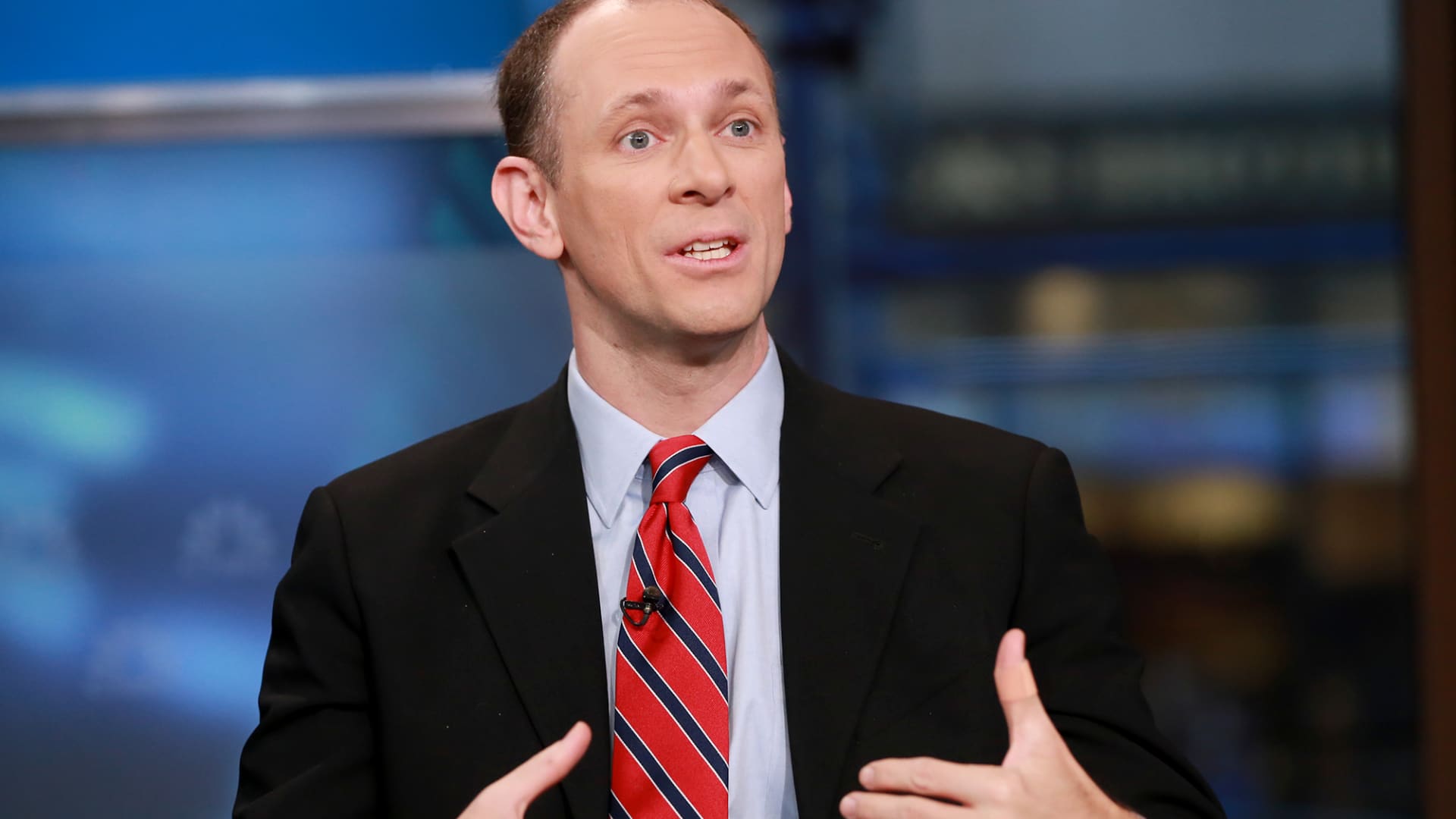
Chicago Federal Reserve President Austan Goolsbee said Friday that inflation progress has "stalled," meaning policymakers likely will have to be patient before cutting interest rates.
While he still expressed hope that inflation will resume drifting down to the Fed's 2% target, he noted that "persistently high housing inflation" is getting in the way.
"Given the strength of the labor market and progress on easing inflation seen over a longer arc, I believe the Fed's current restrictive monetary policy is appropriate," he said in remarks shared ahead of a speaking engagement to business journalists in Chicago. "Ultimately, the proper policy going forward will depend on the data."
Goolsbee is a nonvoting member this year of the rate-setting Federal Open Market Committee, but will vote in 2025.
— Jeff Cox
Goldman says macro risks raising equity downside risks
Although Goldman Sachs is still forecasting "modest" positive equity returns over the next 12 months, it sees increasing risks to the downside — and notes the likely upside is smaller than before.
"U.S. equity valuations are still high relative to the macro environment," macro strategist Vickie Chang wrote in a Thursday note.
"So while equity overvaluation may be a headwind that positive macro dynamics can offset, we find evidence that it has an amplifying effect when the macro dynamics turn negative," Chang added.
— Hakyung Kim
Dow opens higher
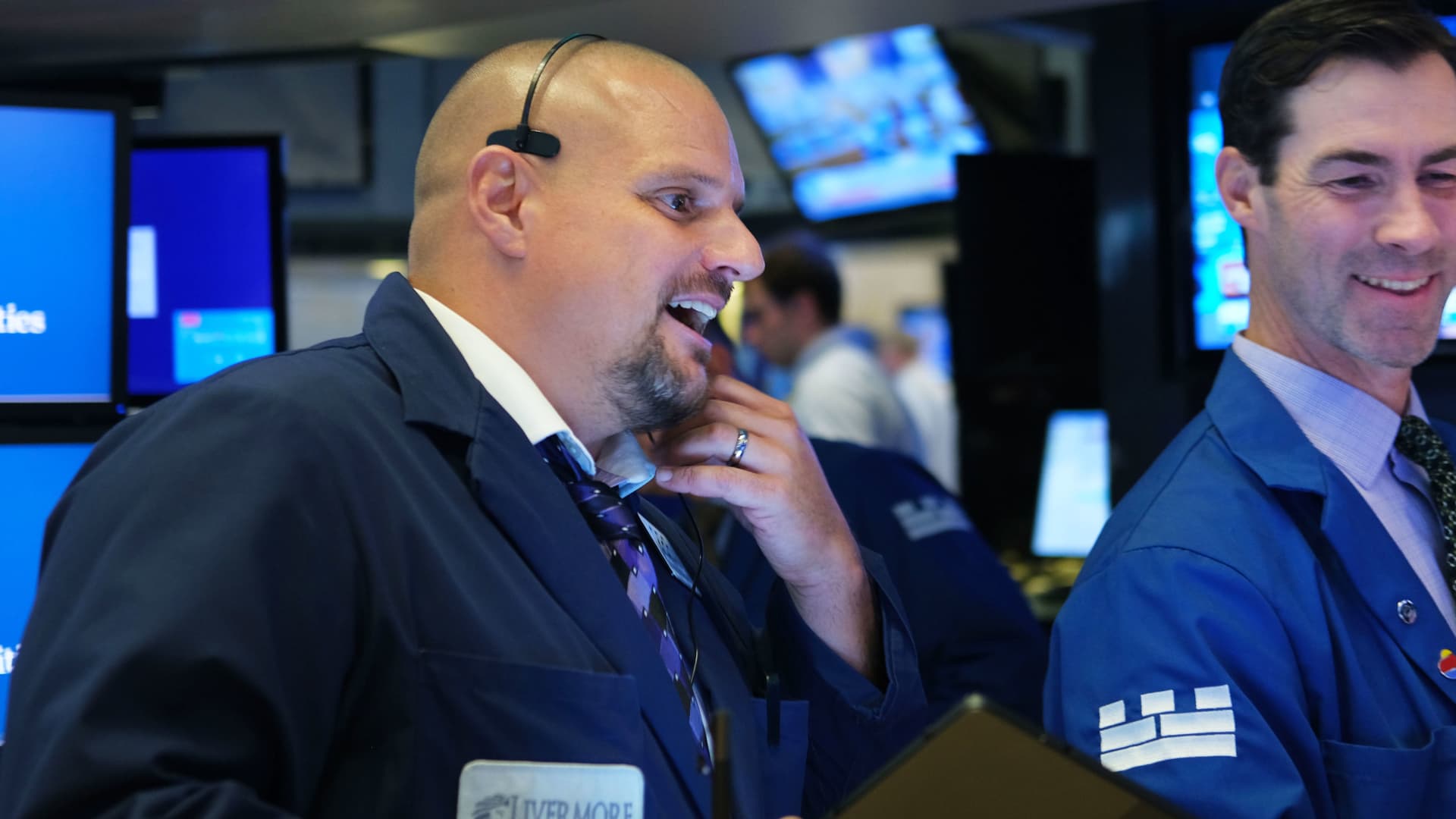
The Dow was up as Friday's trading session kicked off.
The blue-chip index added about 0.2% shortly after 9:30 a.m. ET. Meanwhile, the S&P 500 was near flat, while the Nasdaq Composite slipped 0.3%.
— Alex Harring
Oil prices turn lower as traders realize Israeli strike on Iran was 'carefully calibrated'
Crude oil futures are now trading lower, erasing gains of more than 3% from earlier in the session as it becomes clear that Israel's strike against Iran was limited.
U.S. West Texas Intermediate futures lost 28 cents, or 0.34%, at $82.45 per barrel. Global benchmark Brent crude futures fell 49 cents, or 0.56%, at $86.62 per barrel after topping $90 earlier in the session.
"The energy market has been through this before," said John Kilduff, founding partner at Again Capital. "It's hard to get your head around the fact anymore how high the bar really is in the Middle East these days for all-out war to break out and for oil supplies to be impacted."
That point is driven home by the price action. Despite the news, WTI is on pace to end the week about 4% lower.
The Israeli strike was "very muted and carefully calibrated" using small packages of explosions and drones rather than manned aircraft, said Admiral James Stavridis, the former Supreme Allied Commander of NATO.
"Both capitals, Jerusalem and Tehran, are downplaying the events — de-escalating," Stavridis told CNBC's "Squawk Box" on Friday.
— Spencer Kimball
Stocks making the biggest moves before the bell
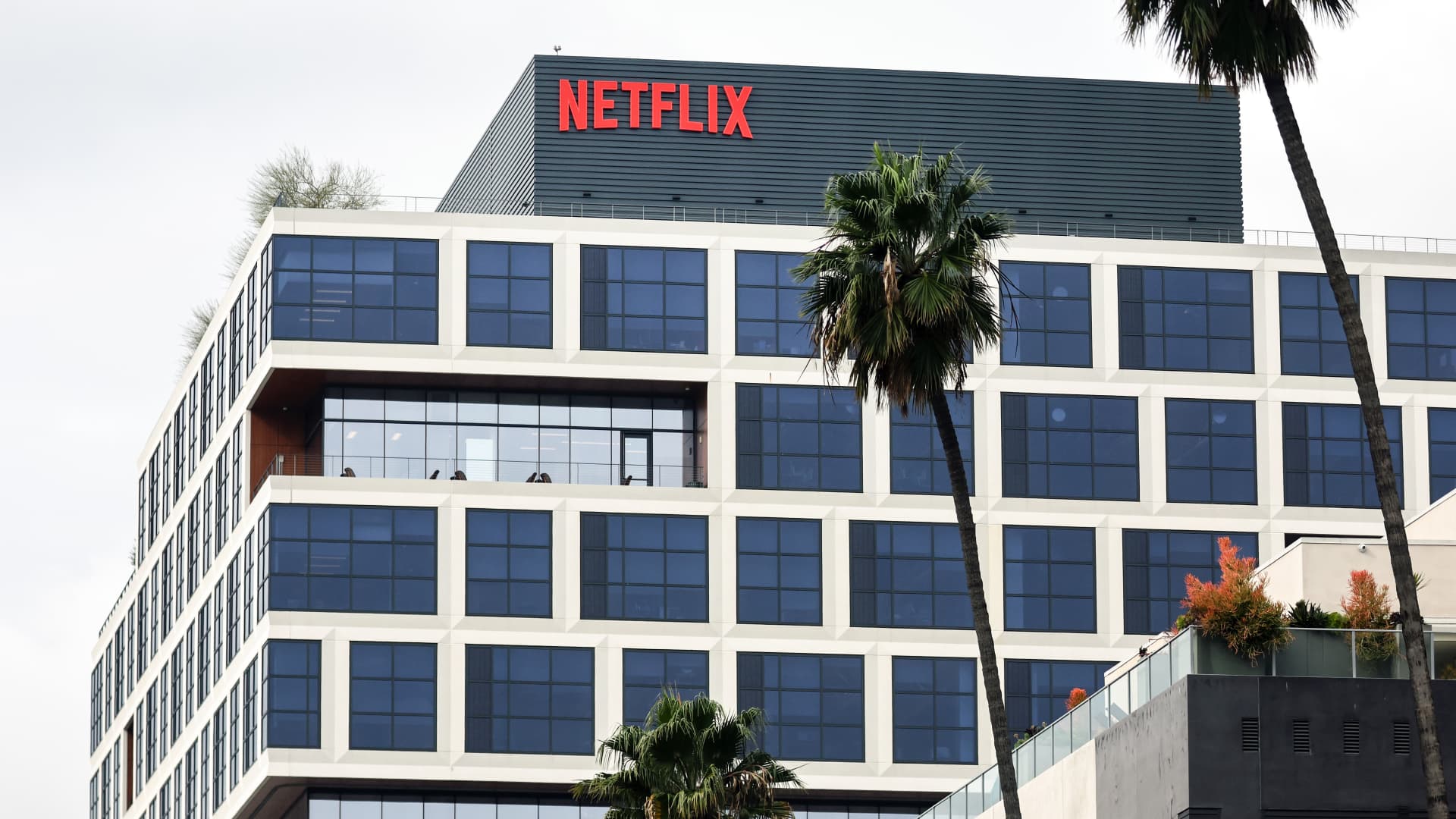
These are the stocks moving the most in premarket trading.
- Netflix — Shares slid nearly 6% after the video streaming platform shared a weaker full-year revenue growth outlook than consensus had expected and said it would no longer report quarterly subscriber gains going forward.
- Paramount — The media stock soared 10% after The New York Times and Bloomberg reported that Sony Pictures Entertainment and Apollo Global Management have been discussing the possibility of teaming up to acquire Paramount in a joint bid.
- Sunnova Energy — The stock slipped nearly 4% after a Wells Fargo downgrade to equal weight.
Read the full list of stocks moving here.
— Lisa Kailai Han
Stocks head for losing week
The three major indexes were on track for notable losses with just one day left in the trading week.
The S&P 500 has fallen for five sessions in a row, a first since October. On the week, the broad index has slid 2.2%.
That would be the large-cap benchmark's third straight negative week, which has not happened since September. It would also mark its worst weekly performance since late October.
The Nasdaq Composite is slated to drop 3.6%, which would mark the biggest loss since September. It would also be the fourth straight negative week, the longest weekly losing streak since December 2022.
The tech-heavy index has also declined for the past five sessions, a first going back to a period ending in January.
The Dow has seen far more modest losses, sliding just about 0.6% this week. This would be the blue-chip average's third-straight down week.
— Alex Harring
Volatility index tops 19

The Cboe Volatility Index briefly spiked back above 19 Friday morning following reports of Israel's strike against Iran.
Wall Street's so-called fear gauge, known as the VIX, had previously reached the level earlier this week. That came in the aftermath of Iran launching drones and missiles at Israel on Saturday.
But the weekend attack was largely thwarted by Israel's defense system. Traders have since been watching Israel's response for any signs of further escalation in the Middle East conflict.
After surpassing 19 earlier in the morning, the Chicago Board Options Exchange's index last sat below the level.
— Alex Harring
Shipping firms rally after Israel carries out operation in Iran

Shares of Asian shipping firms rallied after news that Israel carried out an operation in Iran, with explosions reportedly heard near the airport in Isfahan.
Japanese shippers Mitsui Osk Lines climbed 1.81%, while Kawasaki Kisen and Nippon Yusen were up 0.34% and 1.44%.
Hong Kong shipping firms also climbed, with Pacific Basin spiking 8.68%. Cosco Shipping Holdings was up over 4%, and international logistics firm OOIL, which owns Orient Overseas Container Line, climbed 4.5%.
— Lim Hui Jie
Safe haven assets rise after unconfirmed reports of explosions in Iran; gold hits fresh record

Safe haven assets rose following reports of unconfirmed explosions in Iran, with the country's Fars news agency reportedly saying that explosions were heard near the airport at the country's central Isfahan city, but the reason was unknown.
Spot gold prices surged to a fresh all-time high of 2,411.09 per ounce, while the yen strengthened 0.45% to 153.93 against the U.S. dollar.
Prices of bitcoin fell 1.44% to $60,186, according to Coin Metrics data.
— Lim Hui Jie
Oil prices up 3% after reports of explosions in Iran
Oil prices jumped more than 3% after unconfirmed reports of explosions near the Iranian city of Isfahan.
Iran's Fars news agency reported that explosions were heard near the Isfahan airport, but emphasized that the reason was unknown.
Global benchmark Brent traded 2.86% higher at $89.60 a barrel, while the U.S. West Texas Intermediate rose 2.83% to $85.05 per barrel.
—Lee Ying Shan
Japan headline inflation eases to 2.7% in March, core inflation holds steady at 2.6%
Japan's headline inflation rate came in at 2.7% in March, easing from the 2.8% recorded in February.
Core inflation in the country stood at 2.6%, in line with expectations from economists polled by Reuters and down from February's 2.8%.
The so called "core-core" inflation metric used by the Bank of Japan came in at 2.9% from 3.2%, the first time that the index has fallen below 3% since November 2022.
— Lim Hui Jie
Utilities and consumer staples cling to weekly gains
Defensive corners of the market – utilities and consumer staples – emerged positive on the week even as the S&P 500 faced its third straight losing week.
The two sectors are the only ones in the S&P 500 with a week to date gain. Consumer staples are up 0.49% in the period, led by General Mills and Estee Lauder. Both names are up more than 4% week to date through Thursday.
Utilities, touting a 0.4% weekly gain as of Thursday's close, are being led higher by Southern Company and Consolidated Edison. Both stocks are up more than 2% week to date.

This week's action was marred by higher bond yields and sharp selloffs for stocks. It was especially rough for the rate-sensitive real estate sector and information technology, as both are facing a 4% decline this week.
-Darla Mercado, Chris Hayes
After-hours movers
Check out the companies making headlines after the bell.
Intuitive Surgical — Shares of the provider of robotic-assisted surgical solutions rose 1% after the company posted stronger-than-expected results.
KB Home — The homebuilder advanced nearly 2% after announcing that its board of directors authorized a new $1 billion share repurchase.
Western Alliance — The regional bank stock fell less than 1% in extended trading after the firm posted disappointing earnings.
— Yun Li
Bearishness climbed in latest AAII poll, but bullishness stayed above average for 24th week
Main Street investors became much more bearish in the latest weekly survey from the American Association of Individual Investors, but not by enough to keep bullishness from staying above average for a 24th consecutive week.
Investors pessimistic about the outlook for stock prices over the next six months rose to 34.0% — the highest since early November — from 24% last week.
It was the first time investor bearishness was above the long-term historical average of 31.0% since early November, shortly after the current bull market began.
Bullishness narrowed to 38.3% — still above the long-term historical average of 37.5% — from 43.4% last week. The recent high came the week before Christmas when bullishness touched 52.9%, although readings of 51.7% and 50.0% in early and late March came close.
— Scott Schnipper


